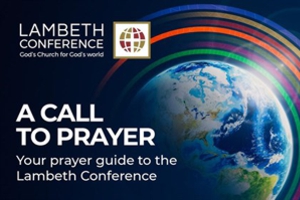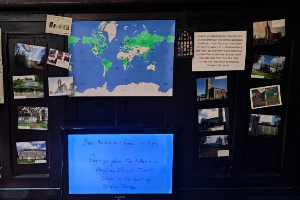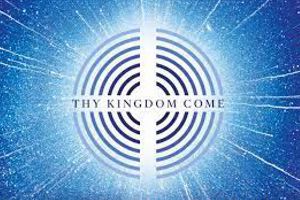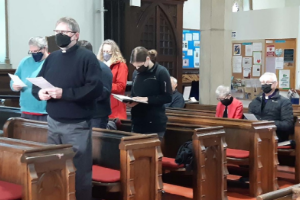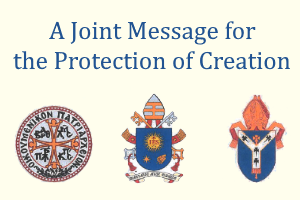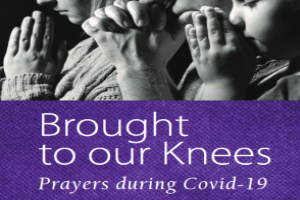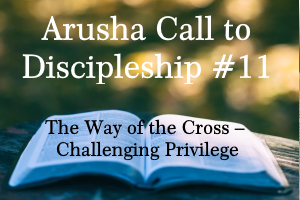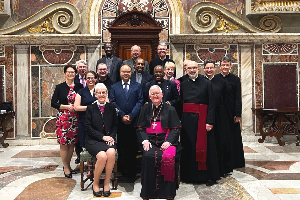
[Continue reading below]
* * * * *
Read the full article, written by Matt Puddister and published on July 5, 2022 on the Anglican Journal website.

[Continue reading below]
* * * * *
Read the full article, written by Matt Puddister and published on July 5, 2022 on the Anglican Journal website.
The fifteenth Lambeth Conference will meet on 26 July – 08 August in Canterbury.
As the conference draws closer, the Archbishop of Canterbury has shared a call to prayer with the conference delegates and their wider church communities.
The call to prayer invites people to devote a day to prayer on Trinity Sunday – 12th June and to pray for the event in the weeks ahead.
The Archbishop of Canterbury says: “The Lambeth Conference theme of ‘God’s Church for God’s World’, reminds us that we are called upon as Christians to pray for the needs of the world. There are many calls upon our prayers at this time: World peace, the global climate crisis, the effects of the pandemic – to name but a few.
“I invite you to call all those in your care to pray for the Lambeth Conference. Please pray that as we meet and consider our shared mission and ministry, that we may hear the call from God. In turn, that we might add our voices to call others to make a difference for Christ in the world.”
A prayer guide has been developed by Brother Christopher John, who is part of the Chaplaincy team at the event.
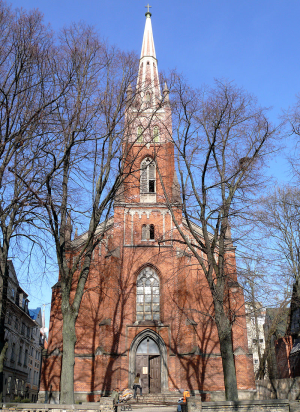
Each May, a country-wide event called Baznīcu nākts (Night of Churches) is held throughout Latvia. The festival lasts well into the night, with churches hosting concerts, lectures, discussions and prayer, and the public is invited to visit multiple churches to learn about cultural and spiritual values.
Typically, St. Saviour's -- the only Anglican Church in Latvia -- displays an exhibition of art created by members of its congregation. For 2022, Churchwarden Joseph Horgan had a different suggestion.
“One idea I had for this year would be a wall/display of postcards from many different churches throughout the Anglican world,” wrote Horgan. “That way, we would be able to represent not only ourselves on this special occasion, but our entire denomination and your church as well!”
In April, he reached out to Anglican dioceses across the globe, and was met with an overwhelming response from people eager to participate.
Congregations were asked to send or email a postcard with a photo of their church, and a message for the St. Saviour's parish or for Latvia in general.
The volume of mail and email increased throughout May, and by Baznīcu nākts, postcards had been received from over 250 churches in 36 countries. Cards were displayed in several areas of St. Saviour's, on walls and in a large display with cards hanging from strings so visitors could read both sides. A digital map was also created, which shows the location of each participating church.
“From the bottom of our hearts, we cannot thank you enough for supporting our Baznīcu nakts (Night of Churches) event by sending us cards for our special display,” wrote Horgan in a message to participating churches. “Throughout Saturday evening, more than 500 people visited [St. Saviour's] and were able to enjoy your cards and learn about your special churches.”
Horgan also mentioned that the event was held one day after the completion of a large ceiling renovation project, so the congregation was thrilled to welcome visitors to see the improvements and access the entire church. Our Cathedral Verger, Jason Parsons, visited St. Saviour's in 2018 and wrote about his experience in the NB Anglican newspaper. Shortly after his visit, the church began its ceiling renovation campaign.
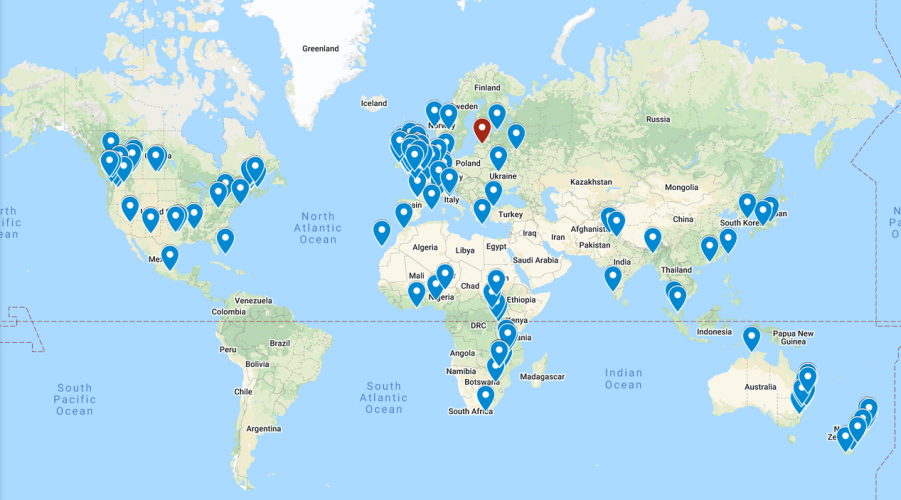
Horgan says, “If you are ever able to make it out to Rīga one day, then perhaps you can find your card on our wall! Thanks again for your friendship and cooperation in making this idea a reality.”
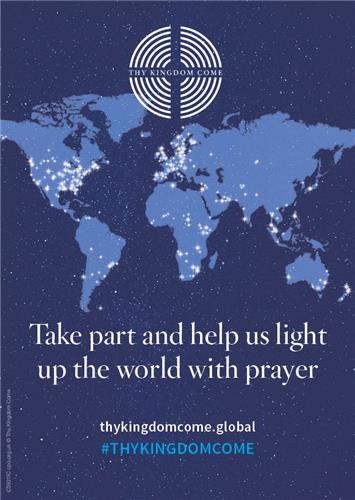
Download the Guide for Eleven Days of Prayer
Join the global wave of prayer calling all Christians to pray between Ascension and Pentecost for more people to come to know the love and peace of Jesus Christ.
Christ Church Cathedral will participate from 26 May - 5 June 2022, with several group and individual prayer initiatives. View the Guide for Eleven Days of Prayer for information about events, resources for all ages, and readings to help you focus. Printed copies are available at the Cathedral and Hall. A Prayer Journal and Novena are also available to download for free on the Thy Kingdom Come website.
Thy Kingdom Come begins with Ascension and ends with Pentecost. Celebrate the Ascension of the Lord on Thursday 26, May at 7:30 p.m. in the Cathedral. Celebrate Pentecost on Sunday, 05 June at 8:00 a.m. and 10:30 a.m. in the Cathedral.
In the days between Ascension and Pentecost, it has been the habit of many Christians, for centuries, to make the focus of our prayers the same as those first believers. Christ’s last instruction to His disciples on the day of his Ascension is to ‘wait for the gift my Father promised’ (Acts 1:4).
Join us each weekday during Thy Kingdom Come for a local discussion (30 min) about the Archbishop of Canterbury’s series of reflections on 1 Peter. We begin at 5:15 p.m. 27 May, online via Zoom or in the Memorial Hall boardroom. Visit the calendar event for the Zoom link. This Novena seeks to enable you in your waiting for the gift the Father promised, by focusing on nine particular verses in the first letter of Peter – one of those present in that upper room. Each day we will take one of those verses and seek to be shaped by it. It’s a book which opens our hearts to God and lifts our eyes to the worldwide family of God.
Each weekday we also read the Daily Office in the morning (8:45 a.m.) and in the evening (4:45 p.m.) in the Cathedral. Join us for this prayer Monday - Friday. It takes about 15 minutes.
Thy Kingdom Come encourages every Christian to pray daily for 5 individuals to know God's love for them in Christ. We hope that you choose to participate in this global prayer movement.
The need for discernment in these uncertain times was the theme of an all-day gathering March 30 at Christ Church Cathedral.
The event began with the annual Blessing of Oils and Renewal of Vows of Ministry. About 40 listened as Archbishop David Edwards preached about the pandemic, its aftermath and the role of the church in that.
“I am reminded of the letter I sent out two years ago, when it all began, about the government closure for two weeks, and saying ‘I think we’ll be back by Palm Sunday,” he said with a wry laugh.
[Continue reading below]
* * * * *
Read the full article, written by Gisele McKnight and published April 5, 2022 on the Anglican Diocese of Fredericton website.
The World Council of Churches’ Conference on World Mission and Evangelism met in Arusha, Tanzania, in March 2018. From this meeting, the more than 1,000 participants, who were all regularly engaged in mission and evangelism, issued the Arusha Call to Discipleship. At our own national church General Synod in 2019, resolution A-129 was passed that we affirm the Arusha Call; encourage bodies within the General Synod to integrate this call into the guiding principles of baptismal living for the shaping of national ministries; and commend the Arusha Call to dioceses for study and inclusion in their considerations of evangelism, witness and discipleship.
Spiritual Development Team members and others are offering reflections in the New Brunswick Anglican on the 12 points within this call. This is Call # 12, written by Archbishop Davis Edwards. Cathedral Dean Geoffrey Hall previously wrote a reflection on Call #5, Director of Christian Formation Kurt Schmidt wrote a reflection on Call #7, and chair of the Diocesan Spiritual Development Team, Cheryl Jacobs wrote a reflection on Call #11.
We are called to live in the light of the resurrection, which offers hope-filled possibilities for transformation.
In 2018 the World Council of Churches (WCC) issued the Arusha Call to Discipleship, then there was COVID-19. The pandemic has highlighted many of the issues which Arusha raised, but also points to something very important. We are one. It does not matter what the issue is, as residents of this planet we are in this together.

This is part of the bigger story. In John 20: 30 -31 the Apostle writes:
“Now Jesus did many other signs in the presence of his disciples, which are not written in this book. But these are written so that you may come to believe that Jesus is the Messiah, the Son of God, and that through believing you may have life in his name.”
The Gospels are not a random collection of stories with meaning. They are intentional about revealing the purposes of God. One of the ways in which this is done is through living a different life in unity with the resurrected Jesus and each other, to demonstrate what the people of God look like, that others might see and believe.
In essence the final point of the Arusha call is a call to life, that being to live in the light of the resurrection, which offers hope for transformation. This happens on all levels, relationship with God, relationship with others and relationship with creation.
During the past year I have read three very sad and disturbing books. They were written by “successful” Christian leaders from different denominations who have not only turned their backs on church, but also on God.
Individually, they had various reasons for leaving, but one thing was consistent: either they or their congregation members were not living transformed lives. They were not necessarily talking about moral failing, but that following Jesus did not seem to be transformative in the way people looked at the world. The models of the world had been adopted by the Church.
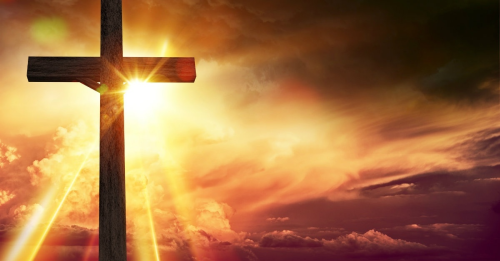
This can be something very simple, but there will be a cost. One of our parishes has partnered with a local coffeeshop/restaurant in a pay-it-forward scheme. They bought a number of free coffees for those who cannot afford them. Cards have been stuck to a board and anyone can take one. This has inspired other people to join in paying it forward.
There are also the big things that we are called to and which we do collectively on a large scale, such as the issues surrounding Residential Schools and Indigenous Peoples. This is something we are working on as a national church.
If we look to Jesus, we see the resurrection life being lived. It is not centred on self, but on others. That is the call we are faced with.
As the Arusha document reminds us, this has to be surrounded with prayer.
“This is not a call that we can answer in our own strength, so the call becomes, in the end, a call to prayer: Loving God, we thank you for the gift of life in all its diversity and beauty. Lord Jesus Christ, crucified and risen, we praise you that you came to find the lost, to free the oppressed, to heal the sick, and to convert the self-centred. Holy Spirit, we rejoice that you breathe in the life of the world and are poured out into our hearts. As we live in the Spirit, may we also walk in the Spirit. Grant us faith and courage to deny ourselves, take up our cross and follow Jesus: becoming pilgrims of justice and peace in our time. For the blessing of your people, the sustaining of the earth, and the glory of your name. Through Christ our Lord, Amen.”
Pope Francis, Ecumenical Patriarch Bartholomew and the Archbishop of Canterbury join together for the first time in urgent appeal for the future of the planet
For the first time, the leaders of the Roman Catholic Church, the Eastern Orthodox Church and the Anglican Communion have jointly warned of the urgency of environmental sustainability, its impact on poverty, and the importance of global cooperation.
[Text from the Archbishop of Canterbury website: 21/07/09]
Pope Francis, Ecumenical Patriarch Bartholomew and Archbishop Justin Welby urge everyone to play their part in ‘choosing life’ for the future of the planet.
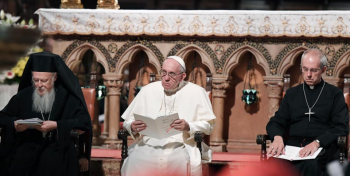
The joint declaration strikes a clear warning - ‘Today, we are paying the price…Tomorrow could be worse’ and concludes that: ‘This is a critical moment. Our children’s future and the future of our common home depend on it.’

The statement calls on people to:
Read the full statement here.
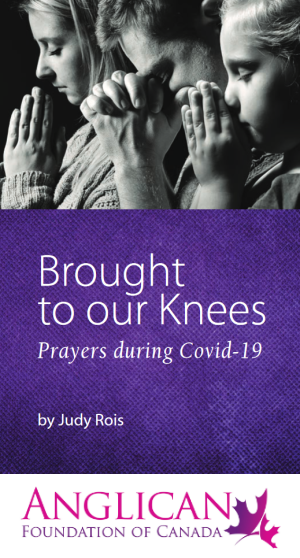
The Anglican Foundation of Canada has published 'Brought to our Knees: Prayers during COVID-19' featuring prayers for individuals who are ill, front-line workers, faith communities, musicians and choirs, students, and summer rest.
Digital copies are free.
Print copies are available for $5 each through the AFC Store.
The prayers were written by The Reverend Canon Dr. Judy Rois, author of two books of prayers for children, and Executive Director of AFC.

“I'm in command. I could order this. But I'm not because, Doctor McCoy is right in pointing out the enormous danger potential in any contact with life and intelligence as fantastically advanced as this. But I must point out that the possibilities, the potential for knowledge and advancement is equally great. Risk. Risk is our business. That's what the starship is all about.”
In the Church, too many of its members believe leadership is more or less a slam-dunk, cut and dried, black and white. The Bishop is the person in command. If something goes right, it shines well on us all. If anything goes wrong, it must be the commander’s fault. Anyone in a position of leadership will quickly acknowledge that “control” is one thing not too often experienced, at least far less often than most would assume.

In the Church, I think Bishops are more accurately and most often in the crow’s nest or the bosun’s chair. At the top of the mast, its possible to see the clouds forming on the horizon forewarning a coming storm. From there, one can see other nautical traffic and make navigational decisions based on the big picture view. From “the top” the world of the ship looks like a different place and the one there always has the advantage of seeing the bigger picture.
And so it is with our bishops. Even knowing that the ship is headed the wrong way, often the best that can be done is to bellow the warning and hope the crew and helms-person of the moment take heed. The crow’s nest can be a helpless place, where the sun shines brightest and all the weather batters with full force. From the point of view of the church-ship’s membership, the orders may sound unproductive, even absurd. From the view on the deck, we all have what we think is the perfect direction for the ship, if we could just take the helm.
Even in the midst of a crisis, when the tiller is set and the sails are trimmed to bring smooth and productive sailing, the wind can suddenly change. Even though with adequate skill and experience most often the ship will reach the intended destination, any captain will admit, its all “in the wind.”
The Church in these days often encounters rough seas and heavy weather. When the boat heels over the crow’s nest feels it first. There is a risk in setting sail and most of the decisions during the journey are exercises in risk-taking. Most bishops who find themselves in this unique Anglican Church of ours – “episcopally lead and synodically governed” – see the huge potential that exists when the followers do so at their choosing and with full knowledge of the risk. Stepping out in faith is “our business.” That’s what the Church is all about.
There is a risk in setting sail and most of the decisions during the journey are exercises in risk-taking.
We all have a secret or not so secret vision of peace, warm soft breezes and never-ending sunshine. Christians call it heaven. The Church is headed there but there’s some sailing to do before we get there. Can we bring ourselves to depend on the advice and direction we receive from the one with the bigger picture? Can we resist grabbing at the wheel every time, from our perspective, we’re not headed in the right direction? Can we all have the faith to know that ultimately, the Maker-of-the-Wind will take us all, including the Ship itself, where we need to go?
This article is a reprise from a past issue of the New Brunswick Anglican. The Very Rev’d Geoffrey Hall is currently Dean of Fredericton.
The World Council of Churches’ Conference on World Mission and Evangelism met in Arusha, Tanzania, in March 2018. From this meeting, the more than 1,000 participants, who were all regularly engaged in mission and evangelism, issued the Arusha Call to Discipleship. At our own national church General Synod in 2019, resolution A-129 was passed that we affirm the Arusha Call; encourage bodies within the General Synod to integrate this call into the guiding principles of baptismal living for the shaping of national ministries; and commend the Arusha Call to dioceses for study and inclusion in their considerations of evangelism, witness and discipleship.
Spiritual Development Team members and others are offering reflections in the New Brunswick Anglican on the 12 points within this call. This is Call # 11, written by Cheryl Jacobs, chair of the Diocesan Spiritual Development Team. Cathedral Dean Geoffrey Hall previously wrote a reflection on Call #5, and Director of Christian Formation Kurt Schmidt wrote a reflection on Call #7.
We are called to follow the way of the cross, which challenges elitism, privilege, personal and structural power (Luke 9:23).
Then he said to them all: “Whoever wants to be my disciple must deny themselves and take up their cross daily and follow me.” Luke 9:23 NIV
Take up your cross, the Saviour said,
if you would my disciple be;
deny yourself, the world
forsake,
and humbly follow after me.
This familiar hymn, originally from a poem by Charles Everest, was sung at the worship service I was attending in Lent. I would say it was very familiar to me, but this time the third verse particularly struck me as if for the first time:
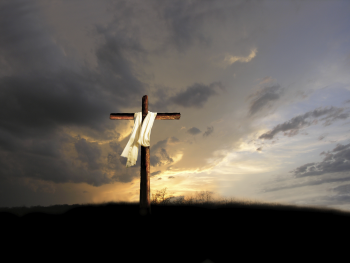
and let your foolish pride be still:
your Lord for you endured to die
upon a cross, on Calvary’s hill.
I, personally, am not a big fan of being shamed. Of course, as a person of European descent, privileged by good income and education, perhaps I am not often in a situation of being ashamed.
In fact, most of my feelings of shame are because I “have left undone those things which [I] ought to have done ... and have done those things which [I} ought not to have done.”
Part of the human condition, yes, and forgiven by the grace of our loving God, but a shame of my own making.
Many people, however, are made to feel shame, not for things of their own choosing, but rather because of their race, skin tone, language, biological sex, sexuality, or because they understand themselves as different from the general cultural norms.
Many of us have recently been enjoying listening to National Indigenous Archbishop Mark MacDonald. In April, while speaking to an Ottawa group on the reconciliation efforts by the Anglican Church of Canada, Archbishop Mark noted that most racism is inadvertent. These ways are encoded in us and “the ceiling” is invisible to those who impose it.
We Canadians typically identify with the descriptors “nice” and “fair,” and we find it hard to accept that systemic racism is a thing.
This, however, is certainly no excuse for us.
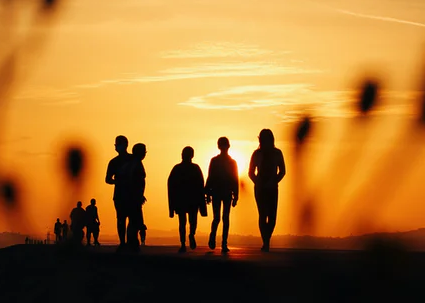
No! Elitism, privilege, personal and structural power are not the plan of God. In fact, as 1 Corinthians 1: 27-29 says: Isn’t it obvious that God deliberately chose men and women that the culture overlooks and exploits and abuses, chose these “nobodies” to expose the hollow pretensions of the “somebodies”?
That makes it quite clear that none of you can get by with blowing your own horn before God. (The Message)
Jesus goes on to say in Luke 9: “What good is it for someone to gain the whole world, and yet lose or forfeit their very self ?” (vs 25)
If we believe that Jesus is Lord of an eternal kingdom and that promise is for us, then really ‘what good is it’ to be one of the elite here and now? ‘What good is’ one’s privilege? ‘What good is’ power in this world, when it will always be nothing compared to God’s power?
So then, what does it mean to follow the way of the cross, to take it up daily?
At least in part, it means that we need to work harder to understand our own privilege, elitism, selfishness, and blindness — and we need to do this personally and as church communities.
Perhaps church communities can agree to hold each other accountable on privilege and racism. Let us talk together and ask BIPOC (Black, Indigenous, People of Colour), the LGBTQIA+ community, the homeless and other vulnerable persons to call us out when our attitudes are wrong.
As Archbishop of Canterbury Justin Welby says in his introduction to the Difference course: “When... we begin to handle diversity creatively and sincerely, honouring one another in our deep difference... we can begin to flourish together in previously unthinkable ways.” Perhaps, too, we should question why the Church is struggling so much to be back in the place of power it occupied for many of the last centuries and instead, seek to be the subversive agents for love in this world that God intended.
Take up your cross, let not its weight
fill your weak soul with vain alarm;
his strength shall bear your spirit up,
and brace your heart, and nerve your arm.
by Cheryl Jacobs
